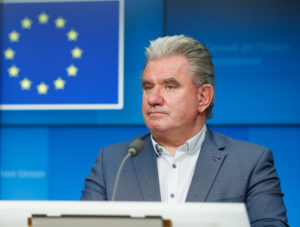
Minister of Environment and Spatial Planning Andrej Vizjak attended the last meeting of the Environment Council held during the Slovenian Presidency of the Council of the EU. The Slovenian Presidency presented a progress report on the negotiations on the proposal for a regulation on batteries and waste batteries, which is an integral part of the European Green Deal. The proposals contained in the “Fit for 55” package was the main priority of the Slovenian Presidency, which has endeavored to move forward as much as possible and to adopt a coherent approach to dealing with issues of a highly horizontal nature.
Ministers also exchanged views on the new EU strategy on soils, in particular focusing on the adequacy of the measures envisaged and the legislative regulation of this area at EU level.
Under the Slovenian Presidency, ministers also held the first formal debate on the “Fit for 55” legislative package aimed at reducing greenhouse gas emissions by at least 55% by 2030 and achieving climate neutrality by 2050. However, due to the large number and breadth of the proposals, their interdependence and political importance, work on most files is still in its infancy. There is a clear consensus among member states that joint proposals must achieve the agreed level of climate ambition set out in EU climate law. Minister Vizjak also underlined: “During its mandate, the Slovenian Presidency has endeavored to ensure the greatest possible progress in the handling of individual files within the package.
The Presidency held debates proposed by the Commission on legislative acts falling within the competence of the Environment Council and also addressed the first major problems and questions identified by the Member States. The next French Presidency will thus be able to initiate a more in-depth debate on individual legislative acts and begin to seek individual compromise solutions.
Despite the intense discussions, some issues raised in the report on the progress of negotiations on the proposal for a regulation on batteries and waste batteries, in particular the scope of the regulation (inclusion of a separate category batteries for light transport vehicles), the degree of flexibility in managing waste batteries and changing the purpose of batteries, methods and information content, and in particular the timeframes for the implementation of individual requirements or the appropriate transitional periods for the adaptation of economic operators have remained in abeyance.
Many Member States maintain reservations regarding surveillance due to the complexity of the requirements. Minister Vizjak underlined that “The ministers also held an exchange of views on the new EU strategy on soils, in particular in the light of the adequacy of the measures envisaged and of the legislative regulation of this field at the level of the EU.
-According to the strategy, around 70% of soils are in poor condition and the strategy’s vision is to provide healthy soils by 2050. To this end, it sets a series of medium-term goals by 2030 and targets long term by 2050, most of which are based on existing initiatives and legislation and are defined horizontally and cover a number of areas. The Slovenian Presidency considers that an integrated and very balanced framework will have to be provided, orienting the content in the right direction, stressing that national specificities must be taken into account in its preparation.
The Slovenian Presidency also report on some major international meetings and sessions, including the meeting of the parties to the Climate Change Convention (COP26) in Glasgow in November 2021. And the Barcelona Convention for the Protection of the Mediterranean Sea and its Protocols. At the end of the meeting, Minister Vizjak thanked the trio of presidencies and expressed his support for the efforts made to advance the pending files also during the French presidency.
We are talking about a year 2021 in Europe under the sign of the fight against climate change. Before the political break linked to the holiday season, EU environment ministers met in Brussels. They referred to one of the main climate proposals of the year: The Fit for 55 packages. This strategy should make it possible to reduce CO2 emissions by 55% by 2030.
The Polish government believes that this goal should be postponed responsible for the rise in energy prices, according to Warsaw. But for the Slovenian environment minister, whose country holds the six-monthly presidency of the EU until December 31, this option is not an option.
“I am convinced that the surge in energy prices before winter has absolutely nothing to do with the publication in the middle of the year of the Fit for 55 packages. This is the argument used by some member countries which are trying to paralyze the will of the Member States and the Commission “, replies Andrej Vizjak

















